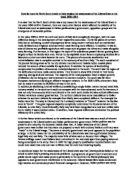To what extent had the pressing political problems of the 1890's in Italy, been solved in 1914
To what extent had the pressing political problems of the 1890's in Italy, been solved in 1914
Italy before the 1890s was a place with so much ambition to catch up with the other countries of Western Europe and to live up to the once great empire of Rome. A massive change began in 1890 and seen as an economic miracle for this change and growth of Italy. This released pressure off political parties of coming up with a reform to kick-start this country that seemed unchangeable. The change could have be due to many factors that where minor.
This change lead to a thrive for new political powers and increased political instability also widening the north and south due to wealth of the north compared to the south. The prime minister of Italy in 1893 Giovanni Giollitti founded the Bank of Italy. This was a massive factor of the economic change in Italy and allowed Italy to hold better access of long-term credits and the organisation and understanding of the economy in Italy. The state created a state budget. Public spending was cut by Sidney Sonnino of whom was the minister of finance from 1894-96. He also raised taxes on raw materials and by 1899 there was an annual budget surplus, which remained in Italy until 1910. Due to these changes confidence grew in investors as the currency grew and became more reliable. Although the economy was growing politics in Italy was failing and the liberal state began to lose its popularity which open doors for revolutionists to come in to popularity. Gelloti’s strive to stop this only lost him respect.








